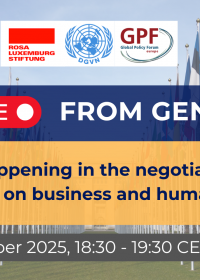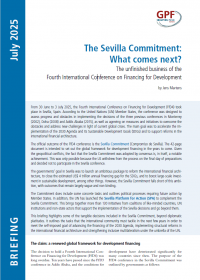GPF Europe’s core mission is to monitor policy making at the United Nations. This includes thematic areas such as sustainable development, human rights, and financing for development as well as global governance, multilateralism, and the funding and reform of the United Nations system.
The UN is the most inclusive international organization with nearly universal membership and commitments to peace, sustainable development and human rights. GPF Europe has a two-pronged approach - to advocate for values espoused by the UN and its agreements, while monitoring and exposing impediments that challenge proper UN operations. These include increasing corporate capture of policy-making at the UN, inadequate funding from the Member States and disregard of their UN agreements.
In this section we post information, analyses, documents, and background material related to multilateralism, the state of the United Nations and its reform, the financing of international organizations, the role of various international “clubs” (like the G20), new forms of public-private interactions, like multi-stakeholder initiatives and global partnerships, the modi operandi of global institutions and their subsidiary bodies, and the role of civil society organizations and social movements. Additional material such as tables and charts on UN Finance is available in our archive.
From October 20 to 24, 2025, negotiations on a legally binding instrument on business and human rights will take place in Geneva (11th session of the open-ended intergovernmental working group (OEIGWG) on transnational corporations and other business enterprises with respect to human rights).
The UN treaty aims to establish binding rules for companies to respect human rights and provide better access to justice for
victims of human rights violations. If adopted, it will pave the way for comprehensive legislation to [...]





